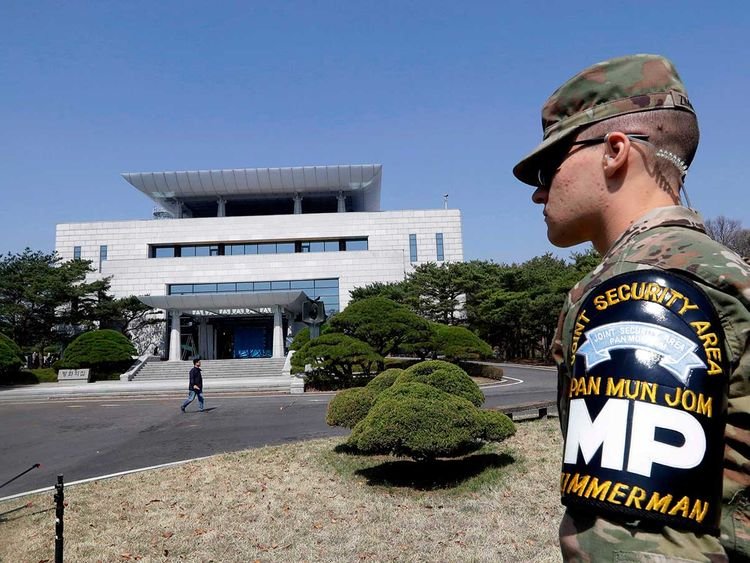U.S. Soldier in North Korean Custody After Unauthorized Border Crossing: A Complex Incident Examined
On July 18, 2023, a significant incident occurred as a U.S. soldier crossed into North Korea without authorization, subsequently finding himself in the custody of the country’s forces. This alarming development prompted responses from both U.S. and international officials, and the United Nations Command confirmed the incident, raising concerns about the soldier’s welfare and the implications for diplomatic relations between the two nations. The soldier in question, identified as Private 2nd Class Travis King, had recently been released from detention in South Korea before embarking on a perplexing journey that led him to North Korean territory. This article delves into the sequence of events surrounding the soldier’s actions, explores the response from defense officials, and analyzes the broader context of North Korea-U.S. relations amidst escalating tensions in the region.
The Unauthorized Crossing and Detention:
The U.S. soldier’s unauthorized crossing into North Korea was deemed “willful and without authorization” by U.S. and international officials. The United Nations Command, responsible for the Joint Security Area within the Demilitarized Zone between North and South Korea, first reported the incident, confirming that an unidentified U.S. national had crossed the border.
Further investigations revealed that the soldier in question was Private 2nd Class Travis King, who had recently served time at a detention facility in South Korea. He was released about a week before the incident and was handed over to officials at the U.S. Army Garrison Humphreys, a significant U.S. military hub in South Korea. From there, King was escorted to the Incheon airport for a return flight to the U.S. as he was scheduled to be separated from the Army. However, upon parting ways with his escort at Customs, he failed to board the plane.
Intriguingly, after going through airport security, King managed to rejoin a border tour group, which eventually led to his crossing into North Korea. Witnesses from the group recounted the confusion and immediate military response to the soldier’s actions, highlighting the heavily militarized nature of the Demilitarized Zone.
Official Responses and Ongoing Investigation:
At the Pentagon, Defense Secretary Lloyd Austin confirmed the incident during a news conference, acknowledging that a service member had crossed the Military Demarcation Line separating the two countries during a tour. Austin refrained from identifying the soldier directly but emphasized that the individual had crossed “willfully and without authorization.” He referred to the North Korean authorities as the Democratic People’s Republic of Korea (DPRK) and acknowledged that they were believed to have custody of the soldier.
Austin assured that the situation was being closely monitored, and efforts were underway to notify the soldier’s next of kin. He stressed that the welfare of the troop remained a top priority, and investigations were ongoing to address the incident.
The Complex Background of North Korea-U.S. Relations:
The incident involving the unauthorized border crossing occurs amidst an already complex relationship between North Korea and the U.S. The Demilitarized Zone separating North and South Korea remains one of the most heavily fortified borders globally, and the two Koreas are technically still at war since the Korean War ended in 1953 with an armistice agreement, not a formal peace treaty. The U.S. has maintained a significant troop presence in South Korea since then, contributing to regional security and stability.
Tensions between North Korea and the U.S., along with key Asian allies South Korea and Japan, have escalated in recent years. While diplomatic efforts were made during the Trump administration, the North has continued to conduct missile and rocket tests that are often seen as violations of United Nations Security Council resolutions. This behavior has raised concerns about North Korea’s nuclear capabilities, with U.S. officials expressing the expectation of a possible nuclear test in the future. The North, on the other hand, criticizes joint military exercises between the U.S. and South Korea, viewing them as preparations for an invasion.
Conclusion:
The incident of a U.S. soldier crossing into North Korea without authorization has added a new layer of complexity to the already intricate North Korea-U.S. relationship. The soldier’s welfare is of paramount concern, and ongoing investigations seek to shed light on the circumstances surrounding the incident. As diplomatic channels are engaged, it remains essential to address the incident with utmost care and diligence to ensure a peaceful resolution and safeguard the regional stability of the Korean Peninsula.




